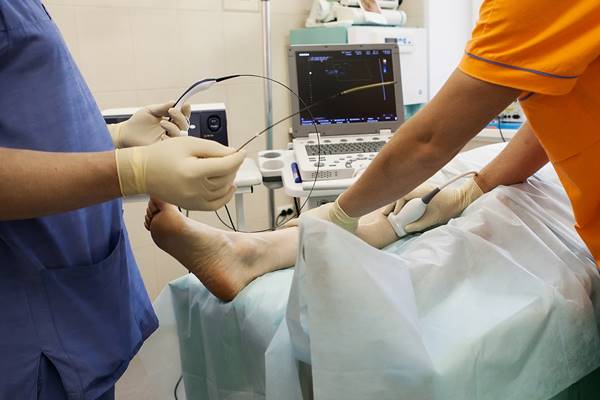Endovenous Laser Therapy (EVLT) is a minimally invasive procedure used to treat varicose veins. It involves the use of laser energy to close off the affected veins, causing them to shrink and eventually disappear.
During the procedure, a small catheter is inserted into the vein and guided using ultrasound imaging. The laser fiber is then inserted through the catheter, delivering energy that heats and seals the vein walls together.
EVLT offers several advantages over traditional vein stripping surgery, including faster recovery times, reduced pain and scarring, and lower risk of complications. It can be performed on an outpatient basis under local anesthesia and typically takes less than an hour to complete.

Who is a Candidate for EVLT?
Not everyone with varicose veins is a candidate for endovenous laser therapy (EVLT). To determine eligibility, a thorough evaluation of the patient’s medical history and current condition is necessary.
Generally, EVLT is recommended for individuals with large, bulging varicose veins that cause discomfort or pain. Additionally, patients who have failed conservative treatments such as compression stockings may also be considered for EVLT.
Those with blood clotting disorders or a history of deep vein thrombosis may not be suitable candidates due to the risk of complications. Patients who are pregnant or breastfeeding should also avoid EVLT until after delivery or cessation of nursing.
Ultimately, the decision to undergo EVLT should be made in consultation with a qualified physician who can assess individual risks and benefits.
How is EVLT Performed?
Endovenous laser therapy (EVLT) is a minimally invasive procedure performed under local anesthesia to treat varicose veins.
The patient lies on their back while the surgeon inserts a thin laser fiber into the affected vein through a small incision.
The fiber is then slowly withdrawn, emitting laser energy that heats up and seals the vein shut from the inside. This process causes the vein to collapse and gradually disappear over time, as blood reroutes to healthier veins.
The procedure typically takes less than an hour and patients can resume normal activities immediately afterward. EVLT is considered a safe and effective treatment option for varicose veins, with minimal discomfort and scarring compared to traditional surgical procedures.
What Are The Benefits Of EVLT?
Endovenous laser therapy (EVLT) is a minimally invasive procedure that uses laser energy to treat varicose veins.
One of the primary benefits of EVLT is that it offers a less invasive alternative to traditional vein stripping surgery. This means that patients experience less pain and discomfort during and after the procedure and can typically return to their normal activities sooner.
Additionally, EVLT has a high success rate in treating varicose veins, with studies reporting success rates of up to 98%.
The procedure also has a low risk of complications and does not require general anesthesia, making it safer for patients who may not be good candidates for surgery. Overall, EVLT provides an effective and convenient treatment option for those suffering from varicose veins.
What are the Risks and Complications of EVLT?
Like any medical procedure, endovenous laser therapy (EVLT) for varicose veins carries some risks and potential complications.
Some of the most common risks associated with EVLT include bruising, swelling, and discomfort at the site of treatment. In rare cases, patients may experience nerve damage or blood clots as a result of the procedure. Additionally, some patients may experience skin discoloration or scarring in the treated area.
It’s important to note that while these risks are possible, they are relatively uncommon and most patients experience few to no complications after undergoing EVLT. Patients should discuss their individual risk factors with their doctor prior to undergoing treatment and follow all post-procedure instructions carefully to minimize the risk of complications.
How Long does it take to Recover from EVLT?
Recovery time after endovenous laser therapy (EVLT) for varicose veins is relatively short. Most patients can resume their normal activities within a day or two after the procedure.
However, it is recommended that patients avoid strenuous exercise for a week or two to prevent any complications. The treated vein may also feel sore and tender for a few days after the procedure, but this discomfort can be managed with over-the-counter pain medication.
Patients are advised to wear compression stockings for at least a week post-procedure to help reduce swelling and improve blood flow. Follow-up appointments with the treating physician are typically scheduled within a week or two of the EVLT to ensure proper healing and monitor progress.
How Effective is EVLT in Treating Varicose Veins?
Endovenous laser therapy (EVLT) is a minimally invasive procedure that has been proven effective in treating varicose veins. Studies have shown that EVLT has a success rate of up to 98% in treating varicose veins, with minimal side effects and a short recovery time.
Over time, the treated vein is absorbed by the body and blood flow is redirected to healthy veins. EVLT is particularly effective for larger varicose veins and can be performed on an outpatient basis. Overall, EVLT offers patients an effective alternative to traditional surgical treatments for varicose veins with less pain and downtime.
Are There Any Alternative Treatments For Varicose Veins?
While Endovenous Laser Therapy (EVLT) is a popular treatment for varicose veins, there are other options available.
Sclerotherapy is a minimally invasive procedure that involves injecting a solution into the affected veins to close them off. This can improve the appearance of varicose veins and reduce discomfort.
Another option is radiofrequency ablation, which uses heat energy to seal off the affected veins.
These treatments may be preferred for patients with smaller varicose veins or spider veins.
Lifestyle changes such as regular exercise, weight management, and avoiding prolonged sitting or standing can also help prevent the development of varicose veins and reduce symptoms in those already affected.
It is important to consult with a healthcare professional to determine the best course of treatment for individual needs.